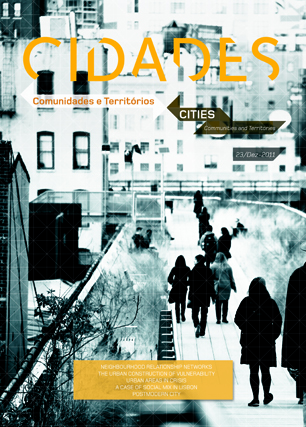As relações de vizinhança nas redes de suporte social num bairro social
Um estudo com residentes no Bairro de Santiago em Aveiro
Palavras-chave:
Rede de Suporte Social, Bairro Social, Relações de VizinhançaResumo
O presente estudo descreve as redes de relações de vizinhança e o suporte social percebido pelos residentes do Bairro de Santiago em Aveiro. A amostra é constituída por 80 residentes do bairro, 50 mulheres e 30 homens, com idades compreendidas entre os 18 e os 83 anos. Para a avaliação das variáveis em estudo foi utilizado um inquérito por questionário para a caracterização da situação sociodemográfica e socioprofissional, assim como a caracterização da residência e da relação percebida com a vizinhança; o Instrumento de Análise da Rede Social Pessoal numa versão adaptada; e o eco-mapa para a caracterização da relação percebida com a rede secundária (Hartman & Laird, 1983). Cerca de metade da amostra referiu que gosta de viver no bairro, caracterizando-o como o seu local ideal de residência, indicando ter uma relação muito próxima com os vizinhos. Os residentes mais velhos do bairro apresentam redes de suporte mais pequenas, mas com um quadrante maior nas relações de vizinhança na rede. O local ideal de residência e a proximidade nas relações de vizinhança parecem ser decisivos na qualidade percebida de suporte, nomeadamente na frequência de contactos com o quadrante da vizinhança na rede social. Este estudo permite-nos uma aproximação à forma como se tecem as redes neste bairro, levando a repensar a intervenção social no sentido de potenciar os recursos das relações de vizinhança e das relações exteriores ao bairro.
Downloads
Publicado
Edição
Secção
Licença
Cidades, Comunidades e Territórios by DINÂMIA'CET-IUL is licensed under a Creative Commons Atribuição-Uso Não-Comercial-Proibição de realização de Obras Derivadas 4.0 Unported License.Permissions beyond the scope of this license may be available at mailto:cidades.dinamiacet@iscte.pt.







